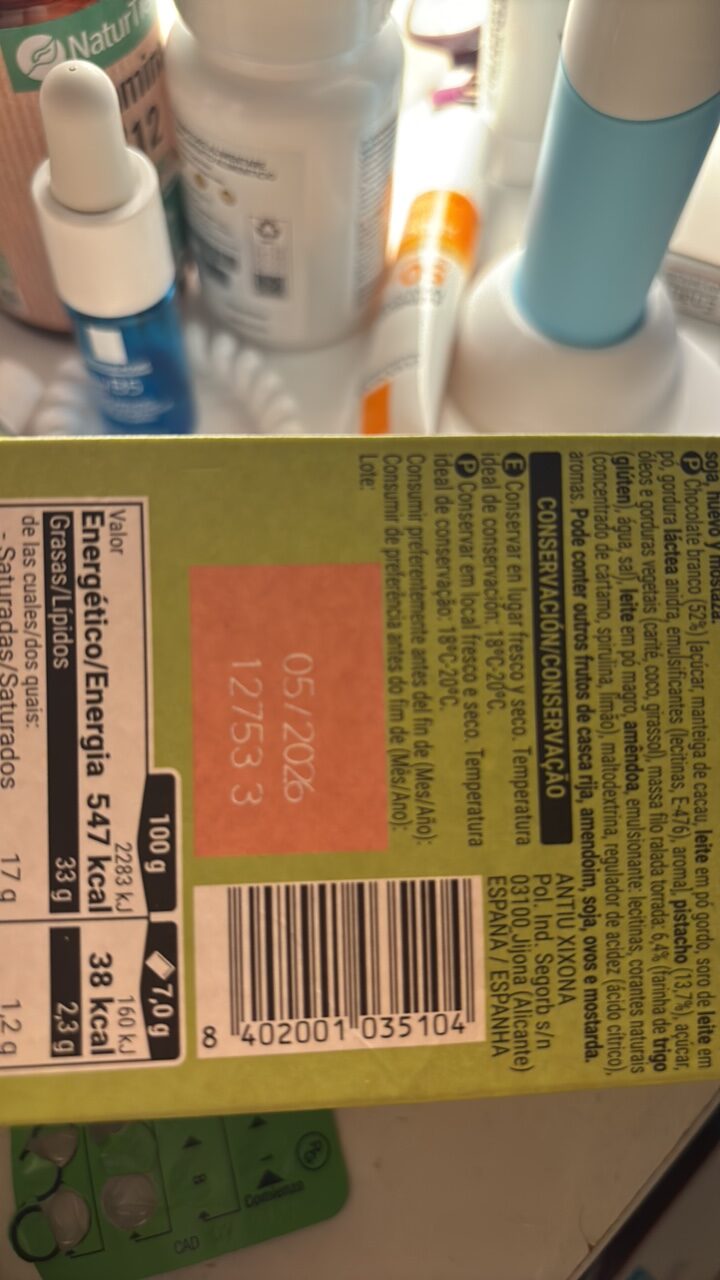
Barcode: 930702967298
chocolate branco
HALAL
📝 Reason: All ingredients listed are either plant-based or derived from Halal sources. No Haram substances or E-codes were identified in the product. The product does not contain any meat or meat by-products, and there are no indications of alcohol or pork derivatives. Therefore, the product is considered Halal.
🏷️ Category: Chocolate
📄 Certificates: Vegetarisch
Ingredients:
Details
Understanding the Halal Status of Chocolate Branco
In the world of sweets, chocolate branco, or white chocolate, has always been a favored choice for many. But for those observing Halal dietary guidelines, the question arises: Is chocolate branco Halal? In brief, yes! Chocolate branco is Halal, and in this article, we will delve into the details that support this claim.
Ingredients Breakdown
The primary ingredients in chocolate branco include:
- Chocolate branco (52%)
- Açúcar (sugar)
- Manteiga de cacau (cocoa butter)
- Leite em pó gordo (full-fat milk powder)
- Soro de leite em pó (whey powder)
- Gordura láctea anidra (anhydrous milk fat)
- Emulsificantes (lecitinas, e-476)
- Aroma (flavorings)
- Pistacho (13,7%)
- Óleos e gorduras vegetais (vegetable fats and oils)
- Massa filo ralada torrada (toasted phyllo dough)
- Farinha de trigo (wheat flour)
- Água (water)
- Sal (salt)
- Leite em pó magro (skimmed milk powder)
- Amêndoa (almonds)
- Corantes naturais (natural colorants)
- Maltodextrina
- Regulador de acidez (citric acid)
Ingredients’ Halal Status
Now, let’s evaluate the Halal status of each ingredient in chocolate branco:
- Chocolate branco (52%): Contains no Haram ingredients.
- Açúcar (Sugar): Generally considered Halal.
- Manteiga de cacau (Cocoa butter): Plant-derived and Halal.
- Leite em pó gordo (Full-fat milk powder): Halal unless contaminated with Haram substances.
- Soro de leite em pó (Whey powder): By-product of cheese; Halal.
- Gordura láctea anidra (Anhydrous milk fat): Halal.
- Emulsificantes (Lecithins, E-476): Lecithin is Halal if derived from Halal sources; E476 is generally considered Halal.
- Aroma (Flavorings): Halal unless derived from Haram sources.
- Pistacho (13.7%): Plant-based and Halal.
- Óleos e gorduras vegetais (Vegetable fats and oils): Halal.
- Massa filo ralada torrada (Toasted phyllo dough): Generally Halal unless compromised.
- Farinha de trigo (Wheat flour): Halal.
- Água (Water): Halal.
- Sal (Salt): Halal.
- Leite em pó magro (Skimmed milk powder): Halal.
- Amêndoa (Almonds): Plant-based and Halal.
- Corantes naturais (Natural colorants): Halal.
- Maltodextrina: Halal if sourced appropriately.
- Regulador de acidez (Citric acid): Halal.
Brand and Certification Context
The chocolate branco in question belongs to the wider category of chocolates and is made to satisfy, not only your sweet tooth but also your dietary requirements. It is produced keeping in mind the standards set for Halal products. Additionally, it is labeled as ‘Vegetarisch’, indicating its compatibility with vegetarian diets. While certification is crucial for consumers seeking Halal assurance, the absence of meat or derivatives ensures its suitability for a broad audience.
Conclusion: Enjoying Chocolate Branco Authentically
If you’re on the lookout for a delicious chocolate treat that satisfies Halal requirements, chocolate branco stands out as a tempting option. With all ingredients verified as Halal, and no presence of Haram substances, you can indulge in this delicacy with peace of mind. So go ahead, savor the rich flavors of chocolate branco knowing it’s compliant with your dietary beliefs!
